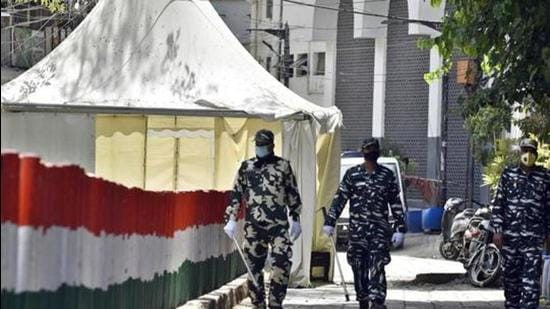No congregation possible at Nizamuddin Markaz, Delhi HC told
The information was given in an inspection report conducted jointly by the city police and Delhi Waqf Board, nearly a month after the court ordered to demarcate the areas and see if they can be opened in adherence to Covid-19 norms and the guidelines issued by the DDMA
New Delhi: The Delhi high court has been informed that the three portions of the Markaz building, which was sealed after the Tablighi Jamaat gathering in 2020, are well defined and separated from each other such that no religious congregation can take place there.

The information was given in an inspection report conducted jointly by the city police and Delhi Waqf Board, nearly a month after the court ordered to demarcate the areas and see if they can be opened in adherence to Covid-19 norms and the guidelines issued by the Delhi Disaster Management Authority (DDMA).
On November 16, the high court directed five members of the city police and the same number of representatives from the Delhi Waqf Board to conduct a joint inspection at the Markaz building.
The report, which HT has seen, said that the Markaz building has three portions -- Masjid Bangley Wali (the mosque), Madrasa Kashif-ul-Uloom and an attached hostel. It said that except the mosque and the hall of the madrasa, there is no other place where people can gather to perform prayers.
“That on the spot, madrasa, masjid and the hostel are already well defined and separated from each other. The construction of madrasa and hostel, except the hall of madrasa, is such that no religious congregation or assemblies can take place in any of those two portions,” the document, filed on December 11, said.
The report, accessed by HT, also says that in the Masjid, there are two portions-- one meant for prayers and another for other religious assemblies—which are demarcated by a green strip on each floor.
The directions for conducting an inspection came when the court was hearing a plea by the Delhi Waqf Board seeking to de-seal the Markaz building, where a Tablighi Jamaat congregation was held amid the Covid-19 pandemic in March 2020.
The report was filed by the standing counsel of the Delhi Waqf Board along with the signatures of five police officials, who were a part of the joint inspection.
The matter will be heard next on January 12, 2022.
The board, in its plea filed through advocate Wajeeh Shafiq, contended that even after Unlock guidelines permitted religious places outside containment zones to be opened, the Markaz complex continued to be locked up.
It further contended that even if the premises are part of any criminal investigation or trial, keeping it “under lock and out of bounds” was a “primitive method” of the inquiry process.
On April 15, the court allowed 50 people to offer namaz five times a day at the Nizamuddin Markaz during Ramzan, saying there is no direction from the DDMA to close down places of worship.
The court allowed namaz to be performed on “the first floor above the basement” of the mosque, making clear that it has to be opened “strictly in accordance” with the DDMA’s April 10 notification and other standard operating protocols.
Stay updated with all top Cities including, Bengaluru, Delhi, Mumbai and more across India. Stay informed on the latest happenings in World News along with Delhi Election 2025 and Delhi Election Result 2025 Live, New Delhi Election Result Live, Kalkaji Election Result Live at Hindustan Times.
Stay updated with all top Cities including, Bengaluru, Delhi, Mumbai and more across India. Stay informed on the latest happenings in World News along with Delhi Election 2025 and Delhi Election Result 2025 Live, New Delhi Election Result Live, Kalkaji Election Result Live at Hindustan Times.





